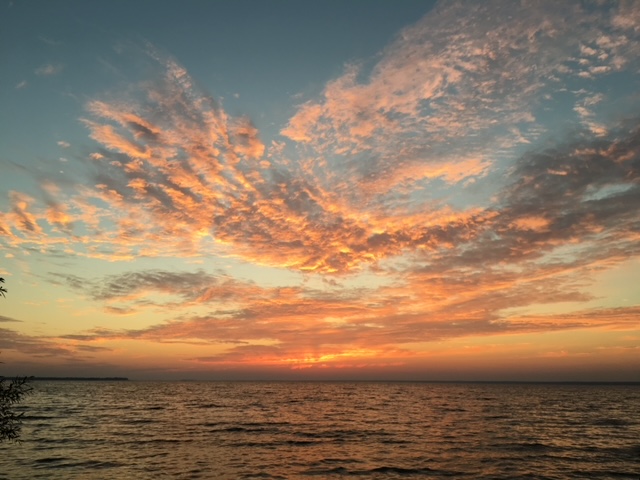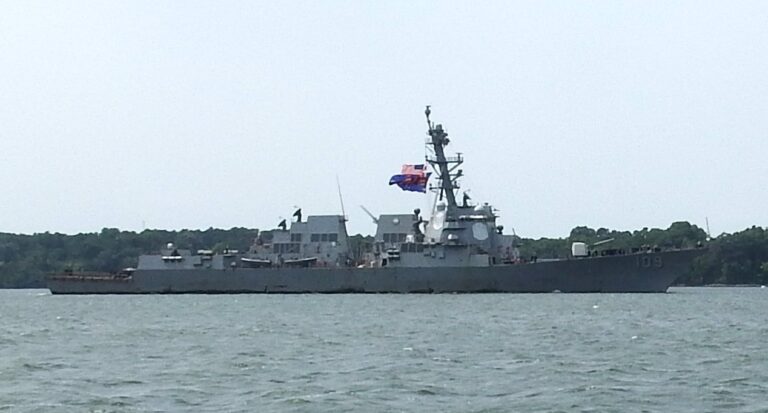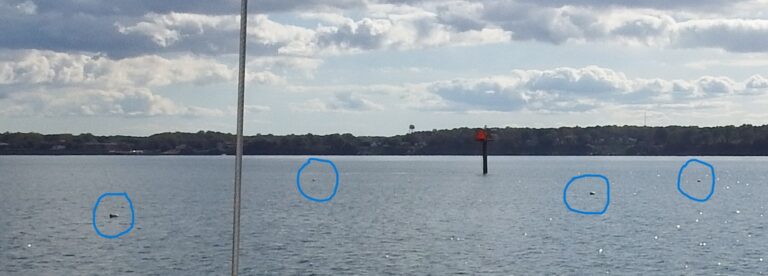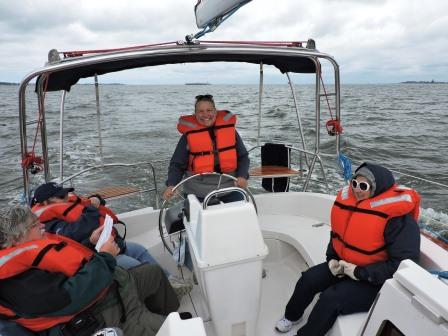
People ask, “Do you conduct burials at sea?” A funeral is hardly a fun thing to do on vacation, but it can be exciting. The Novy siblings gathered from all over the country to make the most of a melancholy situation as they buried their brother at sea.
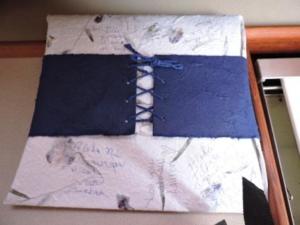 “This is the second service in three days,” explained Martha Novy-Broderick as she took the helm to go sailing near Williamsburg. “Our father was a World War II sergeant in the Army who lived to 83 but never spoke about the war until the last year of his life. When my mom discovered she could be interred with him at Arlington National Cemetery, that’s what she decided on. It was a beautiful ceremony this week. She and my brother Leonard died within a week of each other, but in different states. It was certainly not preordained, since he was only 54.’’
“This is the second service in three days,” explained Martha Novy-Broderick as she took the helm to go sailing near Williamsburg. “Our father was a World War II sergeant in the Army who lived to 83 but never spoke about the war until the last year of his life. When my mom discovered she could be interred with him at Arlington National Cemetery, that’s what she decided on. It was a beautiful ceremony this week. She and my brother Leonard died within a week of each other, but in different states. It was certainly not preordained, since he was only 54.’’
Into the Sea
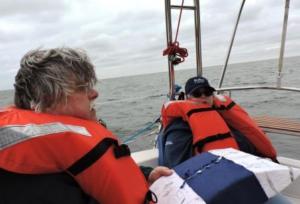 Martha brought her brother Fred, his wife Pat and their sister Deb as we motor-sailed three miles out toward the Chesapeake Bay, as proscribed by the Commonwealth of Virginia. A funeral home arranged Leonard’s remains in an attractive and nautical-themed biodegradable cardboard package.
Martha brought her brother Fred, his wife Pat and their sister Deb as we motor-sailed three miles out toward the Chesapeake Bay, as proscribed by the Commonwealth of Virginia. A funeral home arranged Leonard’s remains in an attractive and nautical-themed biodegradable cardboard package.
Out at the edge of the bay, I took the helm from Martha and turned the sailboat to hove-to by back-winding the genoa against the shrouds. That stopped the boat dead in the water, an apt metaphor for the occasion. I lowered the swim platform to gain access to the water. Martha took the wheel while I brought the package up from the cabin and handed it to Fred. He carefully stepped down to the water and slowly placed the remains in the water as the family paid its last respects.
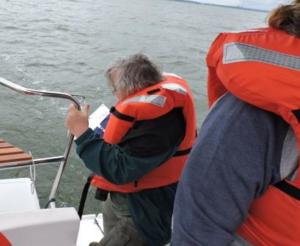 “Goodbye, Leonard… Too soon, Leonard… We love you.” In moments he was gone. Martha said wistfully, “Leonard would quote the country western lyrics, ‘God is great, beer is good, people are crazy.’” I recorded the exact latitude and longitude for the family. Later, Fred said he was glad the ceremony wasn’t prolonged.
“Goodbye, Leonard… Too soon, Leonard… We love you.” In moments he was gone. Martha said wistfully, “Leonard would quote the country western lyrics, ‘God is great, beer is good, people are crazy.’” I recorded the exact latitude and longitude for the family. Later, Fred said he was glad the ceremony wasn’t prolonged.
To cheer everyone up, I recounted the 1781 Battle of the Capes and how the French put four warships at this very spot to bottle up Lord Cornwallis at Yorktown. They appreciated the diversion, albeit that 500 men were killed and wounded in the event.
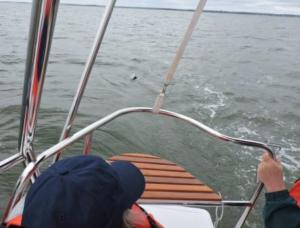 Deb at first was more apprehensive about the sail than the ceremony. She hung on for dear life and explained why she was fearful of the boat heeling too much. “I was with Martha on a small boat in San Francisco Bay when she flipped the thing. And I was terrified. Today I still blame her. I was ten at the time. I haven’t been a boat since.” Eventually she got used to a bigger boat. Martha beamed at the recollection.
Deb at first was more apprehensive about the sail than the ceremony. She hung on for dear life and explained why she was fearful of the boat heeling too much. “I was with Martha on a small boat in San Francisco Bay when she flipped the thing. And I was terrified. Today I still blame her. I was ten at the time. I haven’t been a boat since.” Eventually she got used to a bigger boat. Martha beamed at the recollection.
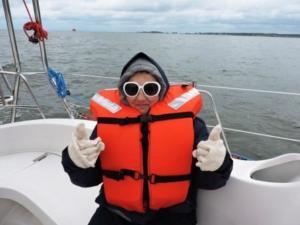 “We belonged to the San Francisco Yacht Club,” Martha explained. “I was out by myself one day in our Rhodes 19 when the wind changed and I found myself drifting toward the rocks of the Golden Gate Bridge. To make matters worse, the current was moving out of the bay at four knots. The yacht club sent out a chaser boat to get me, so everything was fine. My mother was very upset, but my father took it in stride as one more lesson in life – to be prepared for change.
“We belonged to the San Francisco Yacht Club,” Martha explained. “I was out by myself one day in our Rhodes 19 when the wind changed and I found myself drifting toward the rocks of the Golden Gate Bridge. To make matters worse, the current was moving out of the bay at four knots. The yacht club sent out a chaser boat to get me, so everything was fine. My mother was very upset, but my father took it in stride as one more lesson in life – to be prepared for change.
On this day, the wind was howling and the skies were dark after two days of rain. The waves built to 2 feet as we neared the Chesapeake Bay. Martha loved it. “I’m familiar with your bay because my daughter went to George Washington University in DC. Our San Francisco Yacht Club came here to compete against the Annapolis Yacht Club. It was a day like this, and the Annapolis sail team was whining a lot about the conditions. But we thought it was terrific sailing, just like San Francisco.”
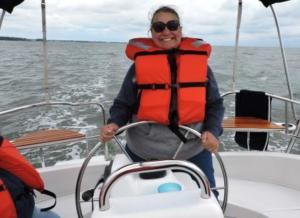 Today, Martha has switched coasts. She teaches business law at the University of Maine. “I saw Walter Cronkite single-hand his yacht into the bay at Casteen. He turned that boat around and kissed the dock perfectly. I thought: Well, I’d like to do that someday. So that’s my retirement dream, to get back on the water with a sailboat.”
Today, Martha has switched coasts. She teaches business law at the University of Maine. “I saw Walter Cronkite single-hand his yacht into the bay at Casteen. He turned that boat around and kissed the dock perfectly. I thought: Well, I’d like to do that someday. So that’s my retirement dream, to get back on the water with a sailboat.”
Out from the Cold
Fred and Pat live in Denver, where he’s retired as the city auditor. They used to live in Fairbanks, Alaska. People in the Lower 48 think about how cold it is, but it’s also dark.
“By now, in May,” Fred said, “they might have six hours of daylight. Come July it will be 16 hours.” What about in the winter? “Not so much,” Pat said. Fred put it in perspective. “It’s all about the headlights. For much of the winter, you leave your headlights on all the time.”
What about the cold? “Minus-68 is about as low as it gets,” Fred said, “but typically it’s in the minus-20s.” Can you tell the difference? “The snow underfoot is much more crunchy at minus-68.” Pat said, “It’s so cold that the water in my eyes freezes.” She didn’t seem to miss it.
Let’s Sail for a Burial at Sea
Scroll down Rates and pick a day for a sailboat charter. Scroll down Reviews on Trip Advisor. Go back to the Home Page of Williamsburg Charter Sails.
burial at sea burial at sea burial at sea

